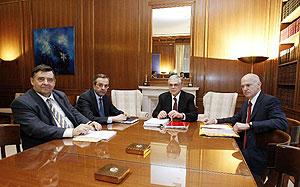Greek coalition party leaders on Thursday concluded a last-minute deal on austerity measures to secure a new bailout package, but a potential resulting fall in Greeks’ living standards has angered many.


Greek coalition party leaders on Thursday concluded a last-minute deal on austerity measures to secure a new bailout package, but a potential resulting fall in Greeks’ living standards has angered many.The agreement, reached just in time before the Eurogroup meeting Thursday night, is deemed vital in exchange for the 130-billion-euro (172.56 billion U.S. dollar) loan offered by the so-called troika of Greek’s international lenders.The bailout is crucial for Greece to escape a bankruptcy that could have major repercussions across the eurozone and the global economy.But while some Greeks are sighing with relief, believing the measures will contribute to efforts to slash deficits and boost development to exit the crisis, some critics argue the measures will only deepen the recession.For example, further austerity will downgrade to "junk status” the living standards of average Greek households, the local daily NEA said.Thousands of protesters hit the streets of central Athens Thursday evening, calling on people to "resist” and demand early elections, while the two main worker unions, GSEE and ADEDY, called for a new 48-hour strike on Friday and Saturday.Dramatizing the tension of labor relations is the resignation of socialist Deputy Minister of Labor Yannis Koutsoukos."Our creditors ignored our arguments in an unacceptable manner that amounts to blackmail, imposing measures that destroy labor relations,” he said in a letter addressed to Prime Minister Lucas Papademos and released to Greek media.His resignation fueled scenarios of a cabinet reshuffle in the coming days and the prospect of snap general elections sooner than April, as expected, amid rumors that the small rightist Popular Orthodox Rally (LAOS) party could announce a walkout from the coalition on Friday.Though the Greek leaders have shown their political will by striking the agreement, after the finance ministers’ meeting there was no immediate approval for the rescue package."Despite the important progress achieved over the last days, we did not yet have all necessary elements on the table to take decisions today,” Eurogroup President Jean-Claude Juncker said at a press conference after a meeting of eurozone finance ministers.






